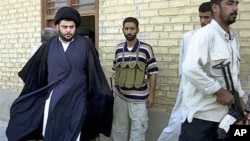|
A Look at Iraq's Muqtada al-Sadr
|
The Iraqi political bloc led by anti-American Shi'ite cleric Muqtada al-Sadr has issued a call to dissolve Iraq's parliament and hold early elections, in a move that could escalate the country's growing sectarian crisis.
The Sadrists said Monday that new elections are the only way to resolve Iraq's deepening political problems because the current government "cannot find solutions" for the issues that "threaten to divide" the country.
Tensions are rising after Iraq's Shi'ite Prime Minister Nouri al-Maliki ordered the arrest of Sunni Vice President Tareq al-Hashemi on suspicion of running a death squad. Hashemi denies the charge and fled to northern Iraq's autonomous Kurdistan region to avoid detention. Maliki also asked parliament to fire Sunni Deputy Prime Minister Saleh al-Mutlaq.
The political crisis comes amid a wave of attacks on the capital, Baghdad, by suspected al-Qaida-linked Sunni extremists.
Al-Qaida's front group in the country, the Islamic State of Iraq, claimed responsibility Monday for a series of bombings that killed about 70 people Thursday - the deadliest day in Iraq for months.
The violence continued Monday as a suicide bomber set off a car bomb outside the Interior ministry. The blast killed seven people and wounded more than 30. Officials said five policemen were among the dead.
The recent violence has raised concerns about the Iraqi government's ability to secure the country as it tries to resolve a political crisis that erupted as the U.S. military completed a troop pullout earlier this month.
Maliki has threatened to form a government without Hashemi's mainly Sunni-backed political party, Iraqiya, which is boycotting parliament and considering whether to pull out of the national unity government.
The leaders of Iraq's Sunni minority have complained the Iraqi prime minister is monopolizing power in the hands of majority Shi'ites and excluding Sunnis from decision-making.
Related video from Iraq
Support from the Sadrist bloc helped Maliki to a second term following nine months of political infighting after an inconclusive election in March 2010. The latest turmoil threatens to wreck Iraq's fragile power-sharing deal that divides positions among the Shi'ite National Alliance, Iraqiya and the Kurdish bloc.
On Sunday, Iraq moved closer to defusing a standoff between the government and 3,400 Iranian dissidents living in a camp northeast of Baghdad. The United Nations and the Iraqi government signed a deal to relocate the residents of Camp Ashraf to a temporary location while their refugee status is determined.
U.S. Secretary of State Hillary Clinton said the residents will be moved to Camp Liberty, the former U.S. military base near the Baghdad International Airport. She welcomed the arrangement, saying it represents “significant progress on this issue.”
U.N. Secretary-General Ban Ki-moon also welcomed the deal, which he said is the beginning of a peaceful and durable solution that respects both Iraq and its human rights obligations.
The exiles are members of a paramilitary group that has tried to topple Iran's government and is listed as a terrorist group by the U.S.
Some information for this report was provided by AP and AFP.
| Join the conversation on our social journalism site - Middle East Voices. Follow our Middle East reports on Twitter and discuss them on our Facebook page. |




